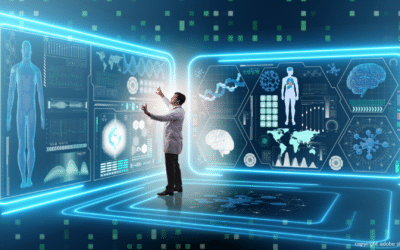Big data analysis and artificial intelligence in healthcare are among the most significant advancements in medicine so far. The AI race is on and Europe is leading with the most top AI researchers according to the H-index measure of quality.
In March 2018, the president of the French republic launched a national strategy on artificial intelligence with the goal of making France a leader in this sector with a focus on health. Data is the foundation for artificial intelligence and is therefore an imperative component to achieve progress in the health care sector. The mathematician and deputy Cédric Villani wrote a report on how to use artificial intelligence meaningfully. In the section “AI to serve healthcare policies”, it was advised to create an accessible platform and promote the sharing of relevant data for research and health innovation. This report was a kickstart of a key project: Health Data Hub.
Health Data Hub: what is it and how does it work?
Health Data Hub is a health data platform put in place by the government to combine existing health databases and facilitate their usage for research and development purposes. It was launched in December 2019, 4 months after the enactment of the law related to the transformation of the health system of which article 41 defined the public interest group (PIG) aka the HDH.
The PIG consists of the government, producers of health data, and users of public and private health data including health research organizations. The grouping brings together 56 stakeholders including the largest French public organization for scientific research CNRS. A decree on April 21st allowed Health Data Hub to receive health data necessary for public interest purposes in connection with the current epidemic of covid-19.
Health data are classified as personal and sensitive data since it reveals information about the health status of individuals. It is prohibited by law to use and exploit the data unless it is for medical research purposes and that the national commission for data protection and liberties (CNIL) provides permission.
In order to access the medical data, the applicant must prove that the project is public interest-driven. A double investigation is carried out for each application. The first one is led by the ethical and scientific committee of researchers in the medical field (CESREES) to verify the relevance of the application, its purpose and if the methodology used corresponds to the expected norms for scientific research. The second investigation is led by the CNIL to make sure that data privacy laws such as RGPD, the law on computing & freedom, and the code of public health are respected.
If the green light is given, the Health Data Hub combines the required data and prepares a secure project space on its platform, which contains only the necessary data for the project.
Implicity Hydro project is the first laureate of the health Data Hub
Hydro, launched by Implicity, is the first pilot project to be authorized by the CNIL. To satisfy the requirements of the CNIL, Implicity has put in place a robust system to guarantee the privacy protection of patients and the confidentiality of their data. With the help of artificial intelligence clinical data and remote monitoring, heart failure crisis needing hospitalization for patients equipped with CIED can be predicted.
Implicity is a leader in remote monitoring in France and has expanded internationally securing deals around Europe and in the united states. The remote monitoring data collected is very useful to the hydro project. The health Data Hub will allow the crossing of data from implantable cardiac devices of more than 20,000 patients in current care with those of the national health data system in order to train predictive models without having to manually label the episodes of interest.
Visit the Health Data Hub website to learn about their phenomenal projects and activities

